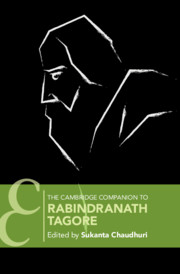Book contents
- Frontmatter
- Contents
- List of Illustrations
- Notes on Contributors
- Preface
- Note on Conventions and Practices
- 1 Rabindranath Tagore: From Art to Life
- 2 A Garland of Many Tagores
- Part I Overviews
- 3 Rabindranath and His Times
- 4 Tagore's Poetry: An Overview
- 5 ‘Something of a Musician’: Tagore's Songs
- 6 Rabindranath Tagore: Drama and Performance
- 7 Imagined Worlds: The Prose Fiction of Rabindranath Tagore
- 8 The English Writings: An Overview
- 9 Tagore and Indian Literature: Influence and Presence
- 10 Rabindranath Tagore and Literary Communication across Borders
- 11 Tagore and the Visual Arts
- Part II Studies
- List of Tagore's Works Cited, with Index
- Further Reading
- General Index
3 - Rabindranath and His Times
from Part I - Overviews
Published online by Cambridge University Press: 24 December 2019
- Frontmatter
- Contents
- List of Illustrations
- Notes on Contributors
- Preface
- Note on Conventions and Practices
- 1 Rabindranath Tagore: From Art to Life
- 2 A Garland of Many Tagores
- Part I Overviews
- 3 Rabindranath and His Times
- 4 Tagore's Poetry: An Overview
- 5 ‘Something of a Musician’: Tagore's Songs
- 6 Rabindranath Tagore: Drama and Performance
- 7 Imagined Worlds: The Prose Fiction of Rabindranath Tagore
- 8 The English Writings: An Overview
- 9 Tagore and Indian Literature: Influence and Presence
- 10 Rabindranath Tagore and Literary Communication across Borders
- 11 Tagore and the Visual Arts
- Part II Studies
- List of Tagore's Works Cited, with Index
- Further Reading
- General Index
Summary
Rabindranāth Tagore, the first non-European Nobel laureate in literature, had a long life (1861–1941) that may be divided into two almost equal phases in two very different eras. The first phase relates to the emergence of colonial and political modernity in Bengal; the second to an age of wars, revolutions, and what he termed a ‘crisis in civilization’. Tagore was influenced by Western modernity from his formative years, yet he came to condemn the engulfing evils of Western colonialism and militant nationalism. The attack, however, was in a constructive spirit, admitting the benefits of engagement with the West: ‘As our encounter with the British has warmed our heart up, the dying forces of our lives are getting conscious again.’
THE INHERITANCE
The impact of Western rationalism led educated Indians, with support from some Europeans, to think of reconstructing society. Major social reforms like the regulation banning sati or widow-burning (1829) and the Hindu Widows Remarriage Act (1856) had taken place before Rabindranath's birth, and institutions for female education set up. But benevolence was hardly the goal of the colonial agenda. The East India Company drained India's wealth for individual and collective profit. Its economic policy forced Indians to supply raw materials cheaply to England and buy back finished products at a higher price. Indigenous craftsmen were robbed of their livelihood to provide cheap labour in the new colonial city of Calcutta (now Kolkata). Lord Cornwallis's Permanent Settlement Act (1793), which permanently impoverished India's peasantry, had its earliest and most pernicious impact in Bengal. Rabindranath observed that the colonial rulers looked upon India as an ‘eternal pet-cow in their royal barn’.
Historians often talk about the ‘Bengal Renaissance’ of the nineteenth century, but like many terms drawn from Western intellectual idiom, its application is problematic. Some early Marxist scholars have stigmatized the period as an age of compradors, Rabindranath and his forefathers among them. By this view, a particular class of Indians, mostly upper-class English educated Bengali Hindus, improved their lot socially and economically in this period: it was a Renaissance for them and them only.
Rabindranath was the scion of a land-owning family, but the privileged, protected ambience of his family mansion at Jorasanko, in the northern part of the burgeoning city of Kolkata, was not cut off from community life.
- Type
- Chapter
- Information
- The Cambridge Companion to Rabindranath Tagore , pp. 27 - 48Publisher: Cambridge University PressPrint publication year: 2020



